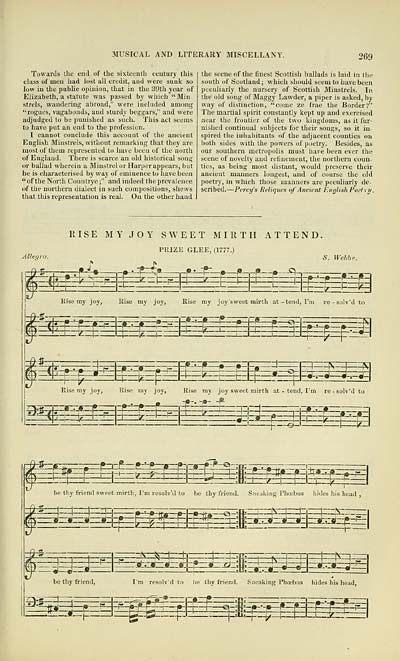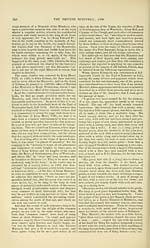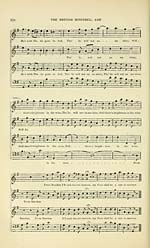Glen Collection of printed music > Printed music > British minstrel, and musical and literary miscellany
(277) Page 269 - Rise my joy sweet mirth attend
Download files
Complete book:
Individual page:
Thumbnail gallery: Grid view | List view

MUSICAL AND LITERARY MISCELLANY.
269
Towards tlie end of the sixteenth century this
class ol'men had lost all credit, and were sunk so
low in the public opinion, that in the 3!)th year of
Elizabeth, a statute was passed by which "Min-
strels, wandering abroad," were included among
"rogues, vagabonds, and sturdy beggars," and were
adjudged to be punished as such. This act seems
to have put an end to the profession.
I cannot conclude this account of the ancient
English Minstrels, without remarking that they are
most of them represented to have been of the north
of England. There is scarce an old historical song
or ballad wherein a Minstrel or Harper appears, but
he is characterised by way of eminence to have been
"of the North Countryc;" and indeed the prevalence
of the northern dialect in such compositions, shews
that this representation is real. On the other hand
the scene of the finest Scottish ballads is laid in the
south of Scotland; which should seem to have been
peculiarly the nursery of Scottish Minstrels. Ii>
the old song of Maggy Lawder, a piper is asked, by
way of distinction, "come ze frae the Border?"
The martial spirit constantly kept up and exercised
near the frontier of the two kingdoms, as it fur-
nished continual subjects for tlieir songs, so it in-
spired the inhabitants of the adjacent counties ou
l)oth sides with the powers of poetry. Besides, as
our southern metropolis must have been ever the
scene of novelty and refinement, the northern coun-
ties, as being most distant, would preserve their
ancient manners longest, and of course the old
poetry, in which those manners are peculiarly de-
scribed. — Percy's Reliques of Ancient Enr/Ush Poetiy.
RISE MY JOY SWEET MIRTH ATTEND.
PRIZE GLEE, (1777.;
269
Towards tlie end of the sixteenth century this
class ol'men had lost all credit, and were sunk so
low in the public opinion, that in the 3!)th year of
Elizabeth, a statute was passed by which "Min-
strels, wandering abroad," were included among
"rogues, vagabonds, and sturdy beggars," and were
adjudged to be punished as such. This act seems
to have put an end to the profession.
I cannot conclude this account of the ancient
English Minstrels, without remarking that they are
most of them represented to have been of the north
of England. There is scarce an old historical song
or ballad wherein a Minstrel or Harper appears, but
he is characterised by way of eminence to have been
"of the North Countryc;" and indeed the prevalence
of the northern dialect in such compositions, shews
that this representation is real. On the other hand
the scene of the finest Scottish ballads is laid in the
south of Scotland; which should seem to have been
peculiarly the nursery of Scottish Minstrels. Ii>
the old song of Maggy Lawder, a piper is asked, by
way of distinction, "come ze frae the Border?"
The martial spirit constantly kept up and exercised
near the frontier of the two kingdoms, as it fur-
nished continual subjects for tlieir songs, so it in-
spired the inhabitants of the adjacent counties ou
l)oth sides with the powers of poetry. Besides, as
our southern metropolis must have been ever the
scene of novelty and refinement, the northern coun-
ties, as being most distant, would preserve their
ancient manners longest, and of course the old
poetry, in which those manners are peculiarly de-
scribed. — Percy's Reliques of Ancient Enr/Ush Poetiy.
RISE MY JOY SWEET MIRTH ATTEND.
PRIZE GLEE, (1777.;
Set display mode to: Large image | Transcription
Images and transcriptions on this page, including medium image downloads, may be used under the Creative Commons Attribution 4.0 International Licence unless otherwise stated. ![]()
| Special collections of printed music > Glen Collection of printed music > Printed music > British minstrel, and musical and literary miscellany > (277) Page 269 - Rise my joy sweet mirth attend |
|---|
| Permanent URL | https://digital.nls.uk/91438269 |
|---|
| Description | Scottish songs and music of the 18th and early 19th centuries, including music for the Highland bagpipe. These are selected items from the collection of John Glen (1833 to 1904). Also includes a few manuscripts, some treatises, and other books on the subject. |
|---|
| Description | The Glen Collection and the Inglis Collection represent mainly 18th and 19th century Scottish music, including Scottish songs. The collections of Berlioz and Verdi collected by bibliographer Cecil Hopkinson contain contemporary and later editions of the works of the two composers Berlioz and Verdi. |
|---|

